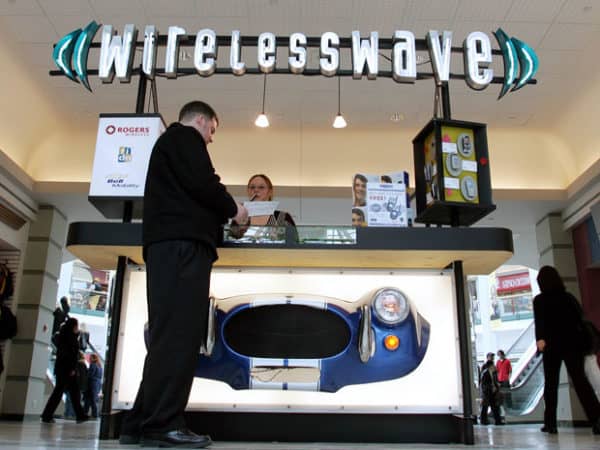
 In British Columbia, Glentel’s roots run deep. After closing the year near the $25 mark, nearly double where it began 2010, casual observers could be excused for imagining that the Burnaby based “Wireless Wave” operator has always been firmly ensconced as a leader here. But Glentel’s story has more twists and turns than the Fraser River, which empties into the Pacific a few miles from the company’s head office. Cantech Letter’s Nick Waddell sat down with Glentel CEO Tom Skidmore to talk about this past and the pheneomenal year the company had. Oh, and to present Glentel with Cantech Letter’s 2010 Canadian Tech Stock of the Year.
In British Columbia, Glentel’s roots run deep. After closing the year near the $25 mark, nearly double where it began 2010, casual observers could be excused for imagining that the Burnaby based “Wireless Wave” operator has always been firmly ensconced as a leader here. But Glentel’s story has more twists and turns than the Fraser River, which empties into the Pacific a few miles from the company’s head office. Cantech Letter’s Nick Waddell sat down with Glentel CEO Tom Skidmore to talk about this past and the pheneomenal year the company had. Oh, and to present Glentel with Cantech Letter’s 2010 Canadian Tech Stock of the Year.
Tom, as we have noted here before, Glentel’s roots go all the way back to your family’s auto-glass shop in New Westminster in the 1940’s. It’s been a long road to having the terrific year you had in 2010. Can you take us back a bit to how the transition happened?
1985 is when we were awarded a national agency with Cantel, which is now Rogers. The connection to the Glentel of today is auto electronics. There were no portables back then, you had to connect the device directly into the fuse box of your car. Two years later the first portable came out – the first big brick Motorola, then there was the Motorola “bag phone” that allowed people to carry them to industrial sites or where ever. Back in the day car phones were not that easy to install, you had to anchor them down, you had to ground them, find the electrical source and you had to put the antenna outside the car, etc etc. But it was just an interesting era that we were in. The whole car phone thing kind of started in Texas, as I remember. The interesting thing there was that there were way more antennas sold than phones.
Why was that?
It was a status symbol. If you had the little curly antenna people would look at your car and say “Wow, he has a phone in his car.” But in many cases there wasn’t a phone in the car there was just an antenna on the outside of the car. For the first three months we sold car phones from a brochure – we didn’t even have the phone to show people. We were basically selling the opportunity to sign up and get a special rate with Cantel or Bell. What we were doing was getting people prepared so that when the network was turned on, then they were ready to go: you had the antennas, you had the phones in, and people subscribed. The original phones were $3500 to $5000 and a lot of them were leased. Today if you charge people $99 they’re not happy! But there was a lot of margin in those phones and over the next ten years we sat back and watched as those margins eroded away and that’s when there had to be a discipline put into place and we started having to bring some extra value to the people that were buying them. That’s when we started evolving, if you look back at 1997 when we started with Wireless Wave, we built it on providing convenience. For many people at that time it was there first real introduction to technology.
What were customer’s concerns at that time?
At first, you had to sell them on the dependability of wireless. But then there was a turning point where business people kind of said “I guess it’s not that big of a risk to have data being transferred over a satellite for my business.” There’s a certain group that are early adopters and then you go into the transition of the various buying groups, but wireless was not quickly embraced. I think people were excited by the novelty, and going mobile changed everything. It changed the way you conducted your business and your personal life because you weren’t attached to a house or an office, or even a car. Now we have watched all the devices evolve. When the BlackBerry came out there was really quick adoption, it was the first time your computer went with you to the coffee shop, and it was revolutionary. And they really did get a good head start on the market and the world.
Where do you think mobile is going now, everyone has a lot of portable computing power in their hands now. What is the next step and where does Glentel fit into this future?
I don’t know if they are going to go much smaller than now, they may go thinner, but there’s a practicality issue. Touch screens are an exciting evolution. What I believe you are going to see is a convergence of all the different softwares that you are using in your personal life and all the hardware that you are using, they will eventually converge into a single unit, perhaps two or three total devices. I think of your tv remote control where you have an array of entertainment devices that you are controlling from one device. To me what slowing the adoption is “how do you do it? I may have the capability with my remotes at home, but maybe what I am lacking is the time to read the manual. Or even when I have read it, do I actually comprehend it? So someone can tell you exactly how something should work. That’s what I believe has really helped Glentel grow. People come to us for absolutely unbiased intelligence and knowledge. We serve and give freely the knowledge that we have gained by showing you how your smart phone actually works.
Do you believe that the culture you have created at Glentel has helped deliver a barrier to entry for competition? It seems the domain expertise you have gained is hard won through the years – you have to know about lease rates in malls, nurture contacts with carriers, keep an army of staff up on the latest devices…
Well it’s a system. There are intangibles that many cannot see. If you don’t invest in training and you aren’t willing to impart that to your team members, then you’re just the same as everybody else.You might as well,just put smart phones and accessories on a wall, put it in the food court and sell it from a shelf. But the fact remains that many many people who own or want to own a smart phone aren’t sure how they work, or how the features of the various phones compare. We try to stay away from industry jargon and speak in plain terms.
Some would say you have a powerful role here between the manufacturers and the customer…
We try our very best to try and extract value for you the customer which helps us when we’re aligning a yield that we may want from our carrier. The carrier has a certain customer that they would like to see on their network. BlackBerry and Apple, there are certain products that they believe have a sweet spot with certain customers and its up to us to try and align what your needs are and what would be the best smart phone and the best carrier. Our team member will work with you and will take time to try and break down the technology so you can be more effective in your personal life and your business life. That’s what we’re always trying to do. We’re trying to find more time and we’re trying to get freedom. All this personal consultation makes our net stickier and as a result we have a lot of customer loyalty. There are no pressure tactics. I can honestly say our team members simply don’t push you into something you can make a couple more dollars on because at the end of the day if you are happy you will be back.
Are your numbers on repeat business high?
They are very high. And what we are seeing now is that every eighteen to twenty four months people are wanting to change their device, they may pass their old one down to another member of the family or a friend. In fact, what we are finding is that that cycle is getting shorter and shorter. I think what people now are trying to understand is do I need a iPhone and an iPad, a BlackBerry and a Playbook. If you are talking to RIM or Apple, well, of course, you need them all! But as I was reading on the weekend the iPhones are starting to cannibalize some of the iPod sales – what we see happening is people willing to lay more money down for a device that has a good phone, a good camera, plays my music, and can organize my work for me.
Glentel now has Glentel University to train your staff. Do you think part of the reason you can command the profits you do is that you are providing a knowledge based service? Do you feel Glentel University is important?
There is no question. As you know we just finished buying a company called Diamond Wireless and interestingly enough through doing so we also acquired Diamond University – they had done the same thing and they found that that was what helped them expand their footprint and expand their customer base, and their loyalty. What is really comes down to Nick, is that you have a device, a BlackBerry, and iPhone, whatever. You can go on the internet and pull down the complete manuals on any one of these smartphones. But then you have to figure out “What’s my individual problem? How do I get this is that app, you can I capture this?” etc etc. Even though we are loyal to two particular carriers, Bell and Rogers, who have three brands each, we encourage our people within our stores to pay no attention to which carrier you are with or which smart phone you have. We aren’t questioning whether or not you bought your smart phone from us, if you want to know some short cuts, or if you have a problem with your phone. I am proud of our staff in those situations because they will embrace you when you come in. Our feeling is that you, eventually are going to buy another phone. When people come into our stores, looking for an iPhone, for instance. There are two questions that come before any others One, Do you sell iPhones? And two, what is the price? After that there is a consultation we go through to try and fit the person to the proper device because you aren’t buying the service from me, I am just facilitating the process. So at the end of the day, the last piece of the puzzle may in fact end up being a number of things, but we want to make sure, and this is important to us, that you get the device that fits your needs. It has to fit your personal life and your business life. Say, for instance, you travel for your business. Say you want to travel from downtown Toronto to Barrie and you want contiguous coverage. Well, you have already eliminated some of the brands because they are roaming and maybe dropping calls. So these are some of the things we think about and try to educate our staff on; phone, price, plan and then, finally which network is best for you?
So Glentel University, is it somewhat akin to the Apple Geniuses in Apple Stores? You have a friendly knowledgeable face. I guess one big difference is you are agnostic, device wise…
Yes, it that friendly face, but we try to instill a depth of knowledge. There are courses on personal development. We talk about how to qualify the customers. It is important that they know the features of the phones. We talk about the manufacturers and we’ll allow manufacturers to come in and instruct our people. We’ll have the carriers come in and explain the advantages of dealing with their particular network. So when you are dealing with one of our team members they are well versed on all brands, features, software all the carriers. There are twenty six course in their training program. This is really a journey for them because the training doesn’t stop. We have ongoing online and classroom training . There’s a continuum of learning in our organization because there are so many things changing. apple may bring out an iPad, BlackBerry has a new tablet, you have Motorola, LG, Samsung, they all have something. So why would you choose one or the other. We will share our knowledge with you about the latest issues around smart phones and tablets. But we’re also qualifying you as a buyer at the same time, learning about you, and making sure that whatever we sell you fits your needs, not what we believe should fit your needs. I believe it all comes back to training our employees to be a constant source of knowledge through ongoing education. If you look at the marketplace today there are a lot of corporations that do not invest a lot into their training, but that
doesn’t work for us.
Additional images:
Comment
One thought on “2010 Canadian Tech Stock of the Year: Glentel”
Leave a Reply
You must be logged in to post a comment.





 Share
Share Tweet
Tweet Share
Share




I’ve owned Gentel shares since the year 2000. Anything to do with wireless seemed pretty magical at that time. In the last two years this stock has certainly come alive with its great dividends and special dividends. Alas, I’ve had to loosen my grip on the shares and take some profits.
Enjoyed reading the interview with Mr.Skidmore and wish him further success in the future. Now if only someone could figure out what to do about all the other wires in my office.